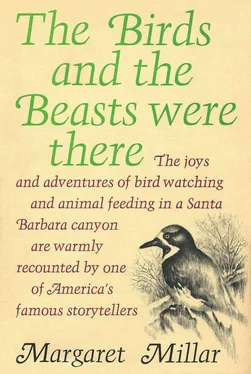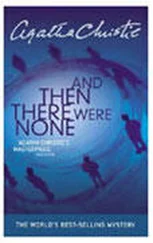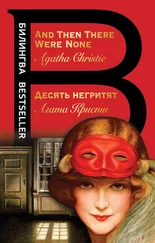Маргарет Миллар - The Birds and the Beasts Were There
Здесь есть возможность читать онлайн «Маргарет Миллар - The Birds and the Beasts Were There» весь текст электронной книги совершенно бесплатно (целиком полную версию без сокращений). В некоторых случаях можно слушать аудио, скачать через торрент в формате fb2 и присутствует краткое содержание. Город: New York, Год выпуска: 1967, Издательство: Random House, Жанр: Природа и животные, на английском языке. Описание произведения, (предисловие) а так же отзывы посетителей доступны на портале библиотеки ЛибКат.
- Название:The Birds and the Beasts Were There
- Автор:
- Издательство:Random House
- Жанр:
- Год:1967
- Город:New York
- ISBN:нет данных
- Рейтинг книги:4 / 5. Голосов: 1
-
Избранное:Добавить в избранное
- Отзывы:
-
Ваша оценка:
- 80
- 1
- 2
- 3
- 4
- 5
The Birds and the Beasts Were There: краткое содержание, описание и аннотация
Предлагаем к чтению аннотацию, описание, краткое содержание или предисловие (зависит от того, что написал сам автор книги «The Birds and the Beasts Were There»). Если вы не нашли необходимую информацию о книге — напишите в комментариях, мы постараемся отыскать её.
The Birds and the Beasts Were There — читать онлайн бесплатно полную книгу (весь текст) целиком
Ниже представлен текст книги, разбитый по страницам. Система сохранения места последней прочитанной страницы, позволяет с удобством читать онлайн бесплатно книгу «The Birds and the Beasts Were There», без необходимости каждый раз заново искать на чём Вы остановились. Поставьте закладку, и сможете в любой момент перейти на страницу, на которой закончили чтение.
Интервал:
Закладка:
It is almost an axiom that the more intelligent a creature is, the more ways he discovers or invents to amuse himself. By this standard Melanie was a genius. At the beginning of her second spring she found out what sport there was to be had on the grounds of the museum — people to laugh at her, animals to snap at her, caged birds to denounce her. There were little girls to howl if she merely, by the purest accident, pulled out a few strands of hair in an attempt to make off with a barrette or bobby pin, and little boys to shriek if she stole their pocketknives or poked them in the stomach while trying to determine if silver belt buckles were detachable. In all fairness to the children, I would like to draw the reader’s attention to the size of a raven. Melanie was two feet long, and with her wings spread, four feet wide, and her beak measured three inches in length and was one inch deep at the nostril. This is a lot of beak attached to a lot of bird.
A good deal of Melanie’s attention was lavished on middle-aged matrons. She had no particular affection for them as such, but they happened to wear more jewelry than any other class of people. Earrings and necklaces, wristwatches, bracelets, jeweled pins and buttons — Melanie adored them all, not because she was female but because she was a raven. I have never heard a satisfactory explanation of why birds of this family find shiny objects irresistible. Perhaps there is no explanation that can be properly translated from ravenese into humanese.
Melanie’s only legitimate jewelry consisted of a pink plastic name band on her right leg, which was meant to indicate to the general public that she was no ordinary bird. She occasionally chewed the band, not with any intention of getting it off — she could have accomplished this in short order with her powerful beak — but in a lazy, desultory way, like a bored teenager chewing gum in class.
Melanie also had a weakness for nipping ankle socks. Her friends claimed she didn’t know that socks contained ankles or that the owners of same would object vociferously. A class of visiting schoolchildren was worth at least an hour of good clean noisy fun. Some of the noise Melanie supplied personally, since ravens are capable of making a wide variety of sounds. The cost of first aid equipment was running high and the number of excuses for Melanie’s conduct was getting low. The result was inevitable — the museum officials decided to banish Melanie from the grounds. As a member of the staff succinctly put it: “One of these days she’s bound to take a hunk out of somebody who doesn’t want to give a hunk.”
The cooperation of Melanie’s adopted family was, of course, necessary. When Melanie’s misdeeds were spelled out to them, they professed great astonishment: “You can’t mean our Melanie. She’s as gentle as a lamb. There must be another raven around.”
This was possible, but the family finally conceded that it seemed rather unlikely there would be another raven wearing on her right leg a pink plastic ankle band with the name Melanie printed on it. At any rate, Melanie was banished.
Her departure caused many changes around the museum. Visiting classes of schoolchildren were oddly quiet and monotonous. A sudden shriek splitting the air conveyed none of the now-what ? excitement of the Melanistic days. The explanation was usually quite dull: a lady had turned her ankle, a Junior Aide had tried to pet the porcupine, a little boy had fallen into the creek or out of a tree.
The mynah bird, who had taken to using Melanie as a confidante, lapsed into a depressed silence and could not be coaxed into repeating the sentiment he had picked up in some mysterious period of his past:
“You’re a stool pigeon, Mother!”
Meanwhile, Melanie’s fame had spread and people from out of town arrived daily, demanding to see “that trained raven,” and taking a dim view of the fact that they’d driven fifty or sixty miles for nothing more than a mynah bird that wouldn’t talk and a porcupine that couldn’t be petted.
Melanie became, in absentia , a kind of folk heroine whose presence had been unappreciated and motives misunderstood. The same people who’d complained most bitterly about Melanie’s conduct now inquired after her health and hinted at her return. The children who’d screamed the loudest over her advances, now vehemently protested her banishment. Teachers who’d accused Melanie of disrupting their classes, ladies left with a single earring and Junior Aides with ankle scars — everyone wanted Melanie back. So back she came.
For the first couple of days after her return Melanie was a changed character. Showing the modesty becoming a folk heroine, she received the extravagant greetings and compliments of her admirers with quiet dignity, and accepted tidbits of food graciously, hardly even maiming a finger. Perched on the railing of the little bridge over the creek she watched with regal detachment the parade of brightly-colored bobby socks, and ponytails held in place by jeweled clasps. Her performance was so convincing that one patron accused museum officials of feeding her tranquilizers, or of doing away with the real Melanie and trying to palm off on the public an inferior substitute.
It was Melanie herself who prevented this accusation from developing into a full-fledged rumor. Her new role, in spite of the fact that she was so good at it, bored her. She was too intelligent and curious for the docile life. She missed the excitement of children racing for cover, the slamming of doors and the honking of horns and the blowing of whistles.
On the third morning after her return, a group of young girls from an out-of-town boarding school arrived at the museum. The girls were in the charge of two nuns, both of whom wore prayer beads. For poor Melanie this was temptation enough, but there was a greater one, something quite new to her world: one of the girls had attached to the laces of her saddle shoes tiny silver bells that tinkled when she walked. The bells — their gloss, their movement, their enchanting sound — were too much for Melanie.
The girls were strangers to Melanie and she to them. Sensing this, she chose surprise tactics. Without a shadow or a whisper of warning, she swooped into the middle of the class, croaking, lunging with her beak and flapping her huge wings. No two witnesses tell the same story about what happened after that, but stories agree that the scene ended with children scattering in all directions and Melanie soaring over the oak trees, carrying a silver bell in her beak while the mynah bird screamed after her: “You’re a stool pigeon, Mother! You’re a stool pigeon, Mother!”
Darkness set in before the last of the children was finally located, so it was not surprising that two days later the museum received a sharp and rather uncharitable letter from the head of the boarding school. A meeting was held, at which three decisions were made:
1. Melanie was Melanie, and any thought of reforming her was ridiculous.
2. All schools should discourage girls from taking up non-sensical fads like wearing bells on their shoes.
3. Visitors to the museum should be asked, on entering the grounds, to remove all jewelry before it was removed for them.
The preceding events were, of course, unknown to me when I first met Melanie. She introduced herself by landing, apparently out of nowhere, on the redwood table where Marie Beals and I were having lunch.
Marie was delighted, I was somewhat less so. A raven in the air is one thing, a raven sharing a table with you is another. And to complicate matters, I didn’t even know what kind of bird Melanie was. To me she was simply the biggest, boldest and blackest I’d ever seen. For a full minute she stood motionless, with her eyes on me, like a vampire bat locating in advance the most vulnerable portion of the jugular vein.
Читать дальшеИнтервал:
Закладка:
Похожие книги на «The Birds and the Beasts Were There»
Представляем Вашему вниманию похожие книги на «The Birds and the Beasts Were There» списком для выбора. Мы отобрали схожую по названию и смыслу литературу в надежде предоставить читателям больше вариантов отыскать новые, интересные, ещё непрочитанные произведения.
Обсуждение, отзывы о книге «The Birds and the Beasts Were There» и просто собственные мнения читателей. Оставьте ваши комментарии, напишите, что Вы думаете о произведении, его смысле или главных героях. Укажите что конкретно понравилось, а что нет, и почему Вы так считаете.



![Маргарет Миллар - Rose's Last Summer [= The Lively Corpse]](/books/384369/margaret-millar-rose-s-last-summer-the-lively-c-thumb.webp)


![Маргарет Миллар - The Iron Gates [= Taste of Fears]](/books/433837/margaret-millar-the-iron-gates-taste-of-fears-thumb.webp)





